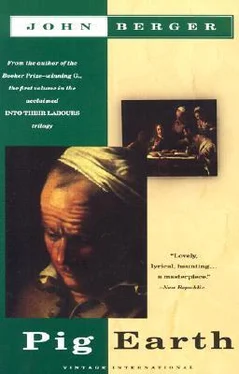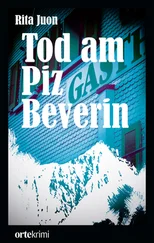Bent forward towards the slope, my face close to the ground, I could see the grasshoppers. There were a couple mating. Their bodies are bright green with streaks of white yellow. They are about three centimetres long, and the noise they make consists of three soft chuffs and then a long drawn-out hiss like a snake.
Tchee tchee hissssss.
When she rolled the blueberries down the wet plank, she must have heard the roar of the Jalent at the bottom of the ravine and the tinkle of the blueberries as they fell into the pan.
When blueberries are wet they darken to the colour of ink. Warm and dry in the sun they almost have a bloom like grapes. As you comb, you notice others a little higher up or a little to the side, and so you move towards them to comb them too with the bear’s paw, and they in turn lead you to others and the others to others. Picking blueberries is like grazing.
As she sorted the fruit she must sometimes have gazed at the orchards and fields on the other side of the ravine, a reminder of all she had lost in her second life.
My bucket was half full. I had climbed out of sight of the place where I had begun.
Jean!
I wasn’t convinced that I had heard her.
How many have you picked?
Half a bucket.
As slow as ever! she mocked.
I have calluses under my chin, I shouted, because all my life I have rested it on the handle of a shovel.
I thought this made her laugh. I could not be sure because there was a jackdaw flying overhead. And the laugh I heard might have been his cry: Drru krrie kriee! Drru krrie kriee!
Shall I help you pick?
If you wish.
I went on picking, and I heard no more, only the grasshoppers, the jackdaw, and occasionally very distantly, when the wind blew, the sound of cowbells.
I learnt what the cowbells said as a boy:
It’s mine! It’s mine! Can it go on? Can it go on? It can’t! It can’t!
I combed with the bear’s paw, following the trail of the berries, grazing higher and higher. The next time I emptied the paw into the bucket, I had the impression that the level of the fruit had mounted twice as fast as before.
I straightened my back and, for the first time since her death, I saw her. She was combing, leaning against the green slope, with her head above the skyline, silhouetted against the blue sky. A scarf was tied round her head. As I watched, she climbed and went over the skyline.
She’s as easy to lose as a button, La Mélanie said.
I left my bucket and climbed up to the crest. She lay there on the other side as if dead. She lay there on the soft turf between the rhododendron bushes whose flowers were finished, and she wore a scarf round her head, a crumpled black dress, socks and boots. Her shins were bare and scratched. Her eyes were shut and her arms were crossed exactly as if she were dead. It is strange I thought that, for I knew she was dead. I had seen her coffin lowered into the earth. Now there was no coffin lid, no earth, nothing but the blue sky above her.
Without thinking I took off my beret and stood there holding it in my clasped hands as I gazed down at her. Her face was grey like the outcrops of limestone. She was as motionless as a boulder. I know that it is easy in the mountains to see things that others cannot see. And then I noticed the fingers of her hands. They were stained an inky blue-black. They were like any of our fingers in André Masson’s class. This was proof that she had indeed been picking blueberries this morning. In September when she was murdered there were no blueberries.
Can you see me now? I heard her say this, although her lips didn’t move.
Without answering, I lay down beside her and gazed up into the sky. The sky was benign and the jackdaws were still circling in wide circles above us.
How old am I? she asked.
You were in the class of 1920. That makes you sixty-eight. No, sixty-seven.
I was born in the morning. My father was milking in the stable. White cloud like smoke was blowing through the door. My mother had her sister and a neighbour with her. I was born very quickly. The neighbour held me up feet first and cried, It’s a girl. Give her to me, my mother said and then she screamed, Jesus forgive me, she screamed, she is marked with the mark of the craving, Jesus! I have marked her with the mark of the craving. Mélanie, said the neighbour, be calm. It is not the mark of the craving.
You know everything about your life now, I said.
If I told you all that I know it would take sixty-seven years.
I turned my head towards her, she was smiling at me, her blue eyes open, dirt smudged on her cheek, a few black hairs escaping from her scarf; she had the face of the Cocadrille at twenty. I moved my arm away from my body to find her hand. When I touched it, I remembered.
She led me by the hand towards the side of the mountain. Crossing an outcrop of rock she stopped, and pointed with the toe of her boot.
Cherry stones in the bird shit! She laughed. They fly with them all the way up here.
I did not recognise the path we took. At first I blamed my memory. Forty-six years is a long time. Soon I doubted whether it was a path at all. The going became steeper and steeper, and we had to push our way through pine trees which grew so close together that no sunlight ever reached the ground. There were centuries of pine needles and my boots sunk into them up to the ankles. I could feel them working their way through the wool of my socks. The needles were either ashen grey or black, they had no more colour than the lower branches of the trees. To prevent ourselves slipping we held on to the branches like ropes.
She led the way and I followed. At one point the slope was so steep that it was like climbing down the trunk of the tree itself. I suddenly remembered the porcelain chamois on her mantelpiece. I wondered whether it was still there. At least three men had fallen to their deaths whilst hunting chamois on this mountain. I hoped that she knew exactly where we were going. I doubted whether I would be capable of climbing up again. My legs were already shaking out of weakness. When I was twelve, Sylvestre, an old man, was trapped on the mountainside. He could neither climb up nor continue down. The alarm was given just before nightfall. Twenty of us with lamps set out to try to find him. If the Cocadrille disappeared, I would be like Sylvestre.
When the Devil grows old, she shouted back at me, he becomes a hermit!
Sylvestre was dead when we found him.
Fortunately she knew the path as she knew all paths. There was not a slope or crag or stream on this mountainside that she did not know. We emerged from the trees into the sunlight. We were at the top of a long bank of grass on which the paths the cows had traced over generations were like steps for us to walk down. A man in Montreal who worked for the radio once sent me a postcard of an ancient Roman theatre. The steps down the grass were like the seats of that theatre. At the bottom was a large pasture bordered by a forest. In front of the forest I could see men working.
Descending the grass steps I suddenly felt as carefree as I did before I was fully grown. Opposite Saint Lucie beside the shortest day, there is Saint Audrey beside the longest. You put on a clean shirt, newly ironed by your mother — it touches your shoulders like the face of a flat iron gone cold — you comb your hair and look at yourself in the mirror, what you see is a sixteen-year-old to whom anything may happen this Sunday. You join friends walking down to the village. You wait in the square. Everything which occurs is part of a preparation. You drink in the café. You read the signs of the future — so many of them are jokes — and yet you remain ignorant. This ignorance makes the time easy and long. You walk to the next village. There is a fight. You notice the consequences of your smallest actions and these consequences never reinforce each other. You walk back by moonlight. The girls flounce their skirts. Almost everything talked about has not yet happened. Father is asleep, beneath the smoked sausages hanging from the ceiling. You fold your trousers with care, scratch your balls and fall asleep. Sunday follows Sunday, season follows season and you go from tree to tree: there is as yet no forest. Then a day comes when there is only a forest and you have to live in it for ever: then all the days, both summer or winter, are short. I never expected to emerge from that forest, yet there I was, walking down the grass steps as if my life lay before me.
Читать дальше












